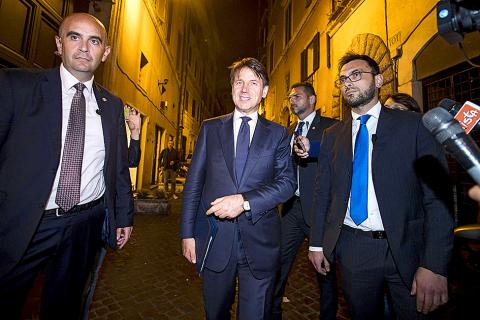Euroskeptic politicians cheered and Milan’s stock index rose yesterday, after Italy’s populists staved off another election and formed western Europe’s first populist government with a last-minute compromise.
The Five Star Movement and the right-wing League party were to swear in their Cabinet later yesterday, capping a roller-coaster week of political and financial turmoil by agreeing to drop a proposed economy minister who had concerned Italian President Sergio Mattarella.
Italian prime minister-designate Giuseppe Conte got a taste of the expectations many Italians have for his revived team as he reported for work, when he was confronted by a group of laid-off workers protesting outside parliament.

Photo: EPA
“You have to trust all of us,” Conte told them.
Milan’s stock index was trading up 2.6 percent and Italy’s borrowing rates eased further after having soared earlier in the week when it appeared that Italy was heading into a new election that could have turned into a referendum on Europe’s shared euro currency.
However, by Thursday night, Five Star leader Luigi di Maio and League leader Matteo Salvini found the compromise that earned them Mattarella’s blessing to form a government: They shifted their euroskeptic candidate for minister of economic development to another ministry and installed a more mainstream economist in his place.
European Commission President Jean-Claude Juncker on Thursday told a conference that he loved Italy, but refused to accept the frequent blame by Italian politicians that Italy’s ills are the EU’s fault.
“Italians have to take care of the poor regions of Italy. That means more work, less corruption,” he said. “We will help them, as we always did, but don’t play this game.”
His comments sparked outrage in Italy, with Salvini blasting them as “racist” in his victory speech.
Commission spokeswoman Mina Andreeva said Juncker “deeply regrets” the comments, loves Italy and is committed to working with its new government.
Italy’s inconclusive parliamentary election in March produced months of political stalemate before Mattarella asked Conte to try to form a government.
The bid failed after Mattarella on Sunday last week vetoed the proposed economy minister, Paolo Savona.
However, investors revolted, sending Italian stocks plummeting and increasing the cost of borrowing to cover Italy’s stubbornly high sovereign debt.
In the new Cabinet, Savona heads the Ministry of Foreign and European Affairs, while the economy ministry goes to Giovanni Tria, a mainstream economist at the University of Rome.
Conte has as deputy premiers his two political masters: Di Maio and Salvini.
Di Maio is taking over as economic minister, while Salvini heads the Ministry of the Interior, the key position to enforce his pledge to expel hundreds of thousands of migrants.

CHIP WAR: The new restrictions are expected to cut off China’s access to Taiwan’s technologies, materials and equipment essential to building AI semiconductors Taiwan has blacklisted Huawei Technologies Co (華為) and Semiconductor Manufacturing International Corp (SMIC, 中芯), dealing another major blow to the two companies spearheading China’s efforts to develop cutting-edge artificial intelligence (AI) chip technologies. The Ministry of Economic Affairs’ International Trade Administration has included Huawei, SMIC and several of their subsidiaries in an update of its so-called strategic high-tech commodities entity list, the latest version on its Web site showed on Saturday. It did not publicly announce the change. Other entities on the list include organizations such as the Taliban and al-Qaeda, as well as companies in China, Iran and elsewhere. Local companies need

CRITICISM: It is generally accepted that the Straits Forum is a CCP ‘united front’ platform, and anyone attending should maintain Taiwan’s dignity, the council said The Mainland Affairs Council (MAC) yesterday said it deeply regrets that former president Ma Ying-jeou (馬英九) echoed the Chinese Communist Party’s (CCP) “one China” principle and “united front” tactics by telling the Straits Forum that Taiwanese yearn for both sides of the Taiwan Strait to move toward “peace” and “integration.” The 17th annual Straits Forum yesterday opened in Xiamen, China, and while the Chinese Nationalist Party’s (KMT) local government heads were absent for the first time in 17 years, Ma attended the forum as “former KMT chairperson” and met with Chinese People’s Political Consultative Conference Chairman Wang Huning (王滬寧). Wang

CROSS-STRAIT: The MAC said it barred the Chinese officials from attending an event, because they failed to provide guarantees that Taiwan would be treated with respect The Mainland Affairs Council (MAC) on Friday night defended its decision to bar Chinese officials and tourism representatives from attending a tourism event in Taipei next month, citing the unsafe conditions for Taiwanese in China. The Taipei International Summer Travel Expo, organized by the Taiwan Tourism Exchange Association, is to run from July 18 to 21. China’s Taiwan Affairs Office spokeswoman Zhu Fenglian (朱鳳蓮) on Friday said that representatives from China’s travel industry were excluded from the expo. The Democratic Progressive Party government is obstructing cross-strait tourism exchange in a vain attempt to ignore the mainstream support for peaceful development

DEFENSE: The US would assist Taiwan in developing a new command and control system, and it would be based on the US-made Link-22, a senior official said The Ministry of National Defense is to propose a special budget to replace the military’s currently fielded command and control system, bolster defensive resilience and acquire more attack drones, a senior defense official said yesterday. The budget would be presented to the legislature in August, the source said on condition of anonymity. Taiwan’s decade-old Syun An (迅安, “Swift Security”) command and control system is a derivative of Lockheed Martin’s Link-16 developed under Washington’s auspices, they said. The Syun An system is difficult to operate, increasingly obsolete and has unresolved problems related to integrating disparate tactical data across the three branches of the military,